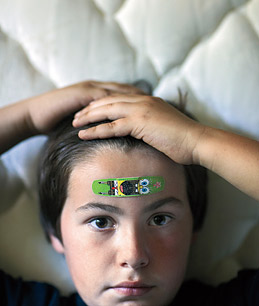
Bethany hated fifth grade. She didn't much care for sixth, seventh or eighth either, but fifth grade was when the trouble really started.
Fifth grade was the year Bethany started to notice boys — and to wonder if she was noticing them quite enough. The girls she knew were already swooning over Kirk Cameron, Michael J. Fox and other teen heartthrobs of the day. She was swooning too, she guessed, but in the same way her friends were? And what about when it came time to kiss a real boy in her own world? Would she want to?
Tales of boys and girls who doubt their sexual stirrings this way often end with their discovering — and eventually embracing — the fact that they're gay. But Bethany (not her real name) wasn't gay, and she knew it instinctively, even if she doubted it constantly. Her anxiety grew from an increasingly common form of obsessive-compulsive disorder (OCD) in which people who may have no moral or cultural qualms about homosexuality suddenly begin despairing of the possibility of ever knowing with blood-test certainty just what their sexuality is. Uncertainty is the fuel for OCD, and the harder a sufferer tries to answer the unanswerable, the hotter the obsessional bonfire burns.
"The preoccupation grew until it became a 20-year nightmare," Bethany says. "I obsessed constantly — looking at other girls to check my reactions, looking at boys and asking myself if I wanted to kiss them. I couldn't shake it."
It wasn't until Bethany was 30 that she found a website for an OCD institute, read about the multiple expressions of the disorder and found that one of them fit her precisely. Her treatment, cognitive-behavioral therapy that taught her to embrace uncertainty rather than fight it, began shortly afterward. Three years later, she's at last enjoying peace and, like so many other adult sufferers of childhood-onset emotional disorders, also grieving the decades she lost to her condition.
All of us, in many ways, are born insane. Our emotions are unregulated; our moods are explosive; we are consumed by irrational fears, erupt into manic happiness, dissolve into inexplicable tears. It takes years — decades really — for an internal emotional governor to come fully online, and in that time, young minds can be prey to all manner of disorders and pathologies. Parents don't always fully grasp that fact, and even doctors may underestimate it, which is understandable. It's not easy even for professionals to separate the normal storms of childhood behavior from the less normal ones. But the numbers tell a clear story.
About one in five children in the U.S. suffers from some sort of emotional or behavioral condition, according to a new study led by the National Academy of Sciences (NAS). Among adults with confirmed ills, 50% were diagnosed before the age of 14 and 75% before 24. The estimated annual price tag for the treatment and consequences of juvenile psychological disorders is $250 billion, with those whose conditions are not caught early contributing to that total for years.
Worse than the money lost to mental illness is the joy lost to it. Epidemiologists speak of what are known as disability adjusted life years (DALYs) — years compromised or diminished by ill health. Among Americans under 25, mental disorders account for 30% of all DALYs; in the 14-to-25 group, it's 48%. For someone like Bethany, two-thirds of her pretreatment lifespan would be considered disability adjusted.
"Childhood is a canary-in-the-coal-mine time," says Dr. Lynn Wegner, an associate professor of pediatrics at the University of North Carolina. "If early signs of mental-health problems aren't correctly managed, they may stay with kids for life."
The good news is that intervention can work, early detection can work and so can a range of gentle, kid-friendly therapeutic techniques that are increasingly being practiced on the young. And that benefits everyone. According to the NAS, every dollar spent by Medicaid or other public-health programs on prevention of mental illness among kids may be paid back as much as 28 times over the course of a lifetime in disability benefits never claimed, adult psychiatric care never needed and, in some cases, crimes never committed, though even public-policy experts don't always recognize that fact. "The savings are often later, and they may be in the jails or in special-ed programs, so we don't always notice them," says professor of psychology Marc Atkins of the University of Illinois at Chicago. "As a society, we don't do a very good job of looking at these factors."